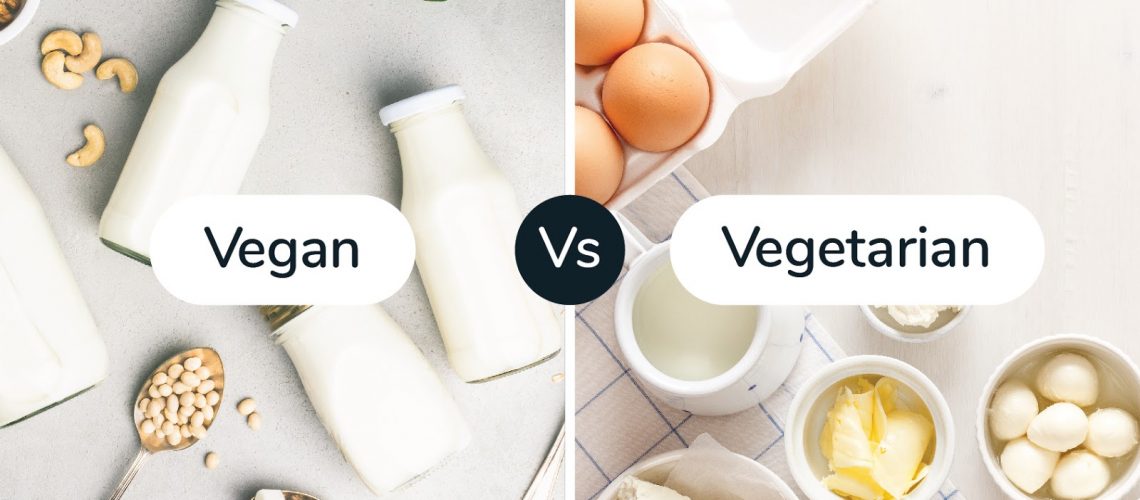
Vegetarian Vs Vegan: What's The Difference?
|
Time to read 5 min
|
Time to read 5 min
If you’re new to the meatless lifestyle, the differences between vegetarians and vegans can seem blurred. After all, the two groups do have similar diets, outlooks, and values. However, big distinctions exist between vegetarians and vegans that go far beyond diet.
As more of the world goes vegan, more questions arise as to what exactly veganism is? And what about vegetarianism? How do the two differ? And is a vegetarian lifestyle keeping pace with veganism or is it slowly losing traction due to the huge surge in veganism?

If you’re deciding to go green, this guide will explore exactly what it means to be vegetarian and vegan – and how the two groups are changing the world we live in.
Vegetarians do not consume animal meat. This includes chicken, beef, and fish and seafood. This is the most popular understanding of the vegetarian diet. However, vegetarians also do not eat insects, gelatine, or animal fats (including stock) (1.).
However, vegetarians do consume products that come from or are made by an animal. For example, vegetarians eat dairy milk and cheese, and eggs.

Vegetarianism has been around as long as humans. In fact, early humans are reported to have been mostly vegetarian (2). Modern vegetarianism emerged in the 1800s where connections to our moral state were tied back to the food we put in our bodies.
Nowadays, vegetarianism is a popular lifestyle choice and vegetarians can be found everywhere on Earth.
There are a lot of different reasons people decide to go vegetarian. They can range from personal ethics, spiritual beliefs, and it can often be a transitional stepping stone to a vegan diet.
The most common reasons people are vegetarian are:
A vegetarian diet consists of a variety of plant-based ingredients and animal derived-products. They include:
While vegetarians, by definition, do not consume meat, there are a few different variations of the vegetarian diet that have emerged over time.
A Lacto-vegetarian is one who eats predominantly plant-based foods with the addition of dairy products. Dairy products that are included in this diet normally consist of milk, cheese, yogurt, and other products containing dairy ingredients.
A Lacto-ovo-vegetarian is one who consumes the above-mentioned foods with the addition of eggs.
A Pesco-vegetarian is one who follows a vegetarian diet but also occasionally adds particular fish products to their diet.
A semi-vegetarian is one who normally consumes a vegetarian diet, but will sporadically eat small amounts of poultry, dairy, and/or eggs on top of a mostly plant-based regimen.
Despite heavy criticisms, vegetarians by definition can purchase and wear products that come from animals.
When it comes to wearing fur and leather, the vegetarian movement is relatively silent. There is not a lot of commentary from vegetarians on this aspect of vegetarianism, which is big way vegetarians differ from vegans, as vegetarianism is, in effect, a diet.
Like vegetarians, vegans do not consume any kind of meat, chicken, or seafood. However, vegans go a step further and do not consume any animal-produced products.
The Vegan Society defines veganism as:
“A philosophy and way of living which seeks to exclude—as far as is possible and practicable—all forms of exploitation of, and cruelty to, animals for food, clothing or any other purpose.” (3)
So, if vegetarianism is best described as a diet, then veganism is a lifestyle.
While food is an important part of veganism, so too is clothing. Vegans are conscious of all aspects of consumption. Whether it’s the meal in front of them or the shirt on their back.
There are a number of reasons people choose to go vegan. The majority of vegans do so out of compassion for animals and the planet. There are also huge health and beauty benefits to a vegan diet, which is a growing reason many people of opting to go vegan.

Common reasons people go vegan:
Vegans eat a plant-based diet. While they do not consume meat, dairy, eggs or honey, their diets are filled with exciting and tasty vegan alternatives.
The mentality that vegans only eat salads has long gone with innovative plant-based companies creating foods so delicious, it’s hard to believe they come from plants.
Some plant-based alternatives vegans can eat are:
It’s safe to say, the days are long gone when vegans were seen as restricted by their diet.
One big difference between vegetarians and vegans is vegans do not purchase or use products that were tested on animals or use products containing animal products.
This includes clothing, makeup, and many household products.
When a product hasn’t been tested on animals, it’s labeled cruelty-free. When a product doesn’t contain animal products, it’s vegan.
The beauty industry is a prime example of where vegan consumption differs from vegetarians. While a vegetarian may not necessarily consider the ingredients in their makeup and beauty products, a vegan would consider is this tested on animals? does it contain animal-derived products?
Purchasing vegan beauty products means you’re sourcing cleaner and more natural products and eliminating a lot of toxins put into many non-vegan beauty products.
If you’re curious to learn more about cruelty-free and vegan skincare this Complete Vegan Skincare Guide has a lot of useful information. If you’re ready to give vegan beauty products a try, Vegancuts’ Beauty Box contains 100% vegan and cruelty-free products delivered right to you each month.

Veganism is growing significantly worldwide – and especially in the United States.
It is estimated close to 10 million people in the US are now vegan.
A study determined the number of vegans in the US shot up 3000% between 2004-2019 (6). That’s likely to keep growing beyond 2020.
Vegetarianism however has remained steady. A reason for this is many people ditching meat in the last decade are also ditching dairy and eggs.
Transitioning to vegan can feel daunting at first.
The foods and products we’ve become accustomed to can be hard to leave behind.
